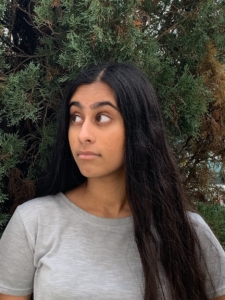Mental Colonialism / A Promise of Promise / Clipped Wings
[poetry]
Mental Colonialism
You had taken up roots in my ancestors’ souls,
burning white roots of hate into our
rich brown skin. Passed down, wrapped firm
around the necks of our dark-haired babies,
their screams echoed and grew into an aversion
to their own reflection. Cut in half, a coconut, you scooped
out the sweet pearly crescents inside and threw the shells
at us with your backs turned as you left.
Carting away our spices, our heavenly thick senses
that my Amma would fold into the foods I’m not
ashamed of anymore. Yet you made me feel
like an anomaly, like the very things you stole
from us, the grains you stockpiled as we starved,
was like the white fabric of this world was
stained with turmeric, like that was revolting instead of
the golden touch. Then you wrote out our triumphant histories
of Kanchipuram silks and masala chai and sea trade empires;
you blotted out our rhythmic, dancing languages;
compelled me to trade my mother tongue for your
brutish beating one, so that I wouldn’t have an accent;
and cut my ancestors’ tongues out of their throats,
when they fought for me like my parents did, yet I speak
your language and not theirs. You told my brothers
they were without mettle, told my sisters they
were monstrous, told us our skin was too dark,
our glorious melanin could protect us from the sun,
but not from your erroneous ideas of true beauty,
that you used to water the trees our youth, that I
grew up with, playing among its branches, grabbing
golden mangos bursting with nectar but painted
with your poisons, your conservatism, your hatred,
your fears, before calling us primitive and backward.
You tortured our sacred lands and made a mockery
of our culture. And one day when my body is burned
on the river bed, only then will the choking parasite
roots that have burrowed into my heart, be
burned away as well. And so, I fight, so that with every
pottu placed on each daughter or son after me,
your poisonous vines will bind them no more.
A Promise of Promise
To be told I was born of promise
stolen away too young, staring
into my flames. A pyre of ability
roaring softly in the wind.
And I’d been a little seed,
tucked inside her all she’d need
a fleeting gust to save away
the squandered dreams
and set her ship on sail.
Battered bruised her hull’d
carry on, too late for the rats
to chew her ropes free.
A story too great for I to hear,
this grandiose plank cannot
float her in this sea. But lovely
on the ears and heart to perceive
such a vision flourishing. These
rays beyond death could not trouble
me, and still to this I prove
how sorry they all would be.
Clipped Wings
I often wonder of the women before me,
birds with their wings clipped in glinting
cages. Yet they struggled and thrashed against
the bars, beating their wings broken until
they could slip between the polished metal
or bent the bars and escaped. Some tamed
the vines that grew beneath them to twist and
enrapture the cage and shape it to their like.
Expectations to idly croon out their melodic
voices and prune their shiny coats with dark
beaks were broken. Some plucked out their
own feathers—given quills they would have taken
over—and painted illustrious epics with their blood.
Certain ravens sharpened their natural wits,
recognized by few, to a jagged point and found
the blinding key, only to be drowned. Forming
roosting communities, broken, torn apart,
fighting on the frontline for injustice of all,
they persisted. Flocks were cut apart, daughters
indoctrinated to disbelief themselves, sold
from father to husband, yet they spread their
wings.
Mother birds raised their chicks, sold their
iridescent feathers, their keys to flight, for
their daughters. They forced apart the bars and
with each generation a few more birds could test
their wings for flight. All the world whispered
seeds of doubt. too fragile. made to be lesser.
Nonetheless they molted their set of clipped wings
and took off into the sky. Some were shot down.
Some survived, flying gloriously through the sky.
I often wonder of the women before me,
what if they were encouraged to soar?
What farther heights could we reach?
if half our wings were
not caged away.
Harsha Venkataraman is a high school student from Austin, TX. She has written for the teen magazine Adolescent Access. Her work can be found in Kealing’s Inkblot Literary Magazine and the LASA Composer.





